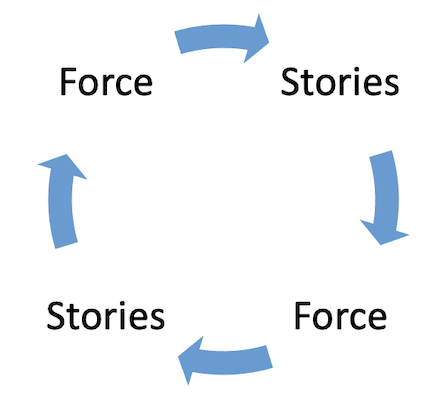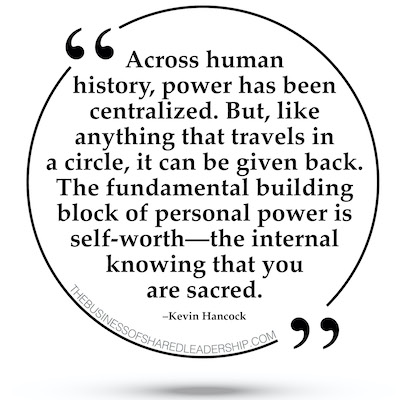2021 IDEA-SHARING ADVENTURE SERIES BY KEVIN HANCOCK
“Bureaucracy and social harmony are inversely proportionate to each other.”
—Leon Trotsky
What are the origins of bureaucracy?
How did “power” historically become centralized in command-and-control hierarchies?
How did certain groups come to exert a defining influence over others?
The answer, at its most fundamental level, is through stories backed by force and force justified through stories.

Slavery was a story backed by force. The subjugation of indigenous peoples across the Americas was also a story backed by force. The September 11, 2001, attack on the twin towers of the World Trade Center is another story backed by force. A traditionally male-dominated society was, and is, a story backed by force. In all cases a narrative defining the superiority of one group and the inferiority of another is required in order to “justify” the inhumane actions required to establish and maintain dominance.
Both the Roman emperors and the European monarchs of the early and Middle Ages reigned on the basis of a story known as the “divine right of kings.” This tale, which became accepted as doctrine and was reinforced by the Church, stated that kings ruled with the backing of heavenly powers.
“The state of monarchy is the supremest thing upon Earth,
for the kings are not only God’s lieutenants upon Earth and sit upon God’s throne,
but even by God himself they are called Gods.”
—James I of England (1610)
Across the Western world this divine right was conveyed upon kings by another co-conspiring hierarchy, the Church.
“Let every soul be subject unto the higher powers.
For there is no power but of God: the powers that are ordained of God.
Whoever, therefore, resisteth the power, resisteth the ordinance of God:
and they that resist shall receive to themselves damnation.”
—Romans 13
All of this presumes a God who takes sides and is vengeful against those who do not follow “his” word.
In the quest to be fully conscious it’s interesting to note that the dominant conclusion of Islam, Christianity, and Judaism is of a hierarchical God who reigns from above, sends commandments below, and judges all. While this may be the case, it’s not the only interpretation. It does, however, conveniently set a precedent for human organizations to follow.
Indoctrination is defined as “the process of teaching a person or group to accept a set of beliefs uncritically.” The key word here is “uncritically.” These beliefs must become so deeply rooted over time that they exist largely unquestioned.
European Americans of the nineteenth century convinced themselves that native peoples were less-worthy humans and therefore exploitable. Southern plantation owners built their society upon the same narrative about people who were black. Slavery and reservations were actually considered “good” and “necessary” for the people subjected to them.
These are dramatic examples of hierarchies established by stories and force, but the model also manifests in more-subtle ways. The place of work, for example, has traditionally been organized around a similar pattern, a ladder of importance and control. The owner and the interests of the business are paramount. The employees, meanwhile, are subservient to the company and expected to follow the instructions that flow down from above.
It can be numbing to consciously confront the origins of our dominant leadership models. It gives me pause to even type these words. I am a white male CEO of a family business. My position in this world came in part through inheritance, as was true of my dad, his dad, and beyond, for six generations. Traveling centuries back in time, a piece of my opportunity emanated from the divine right of kings. Reconciling this and deciding what to do about it has become a priority for me.
 In the end, I can’t change when and where I was born—I do have a company and I am leading it—but I can try to change how that company engages with others and expand the mission it exists to serve.
In the end, I can’t change when and where I was born—I do have a company and I am leading it—but I can try to change how that company engages with others and expand the mission it exists to serve.
This is what brings me to champion the concepts of shared leadership, redistributed power, respect for all voices, and the creation of employee-centric companies that prioritize the people who work there.
Across human history, power has been centralized. But, like anything that travels in a circle, it can be given back. The fundamental building block of personal power is self-worth—the internal knowing that you are sacred. Today’s “kings” must honor this truth by re-dispersing their power.
The first step in creating a new and more-collaborative model for leadership is the uncomfortable task of acknowledging the old one.
“Bureaucracy is the art of making the possible impossible.”
—Javier Salcedo
* * *
Thank you for considering my thoughts. In return I honor yours. Every voice matters. Between our differences lies our future.
____________________